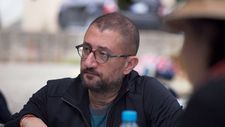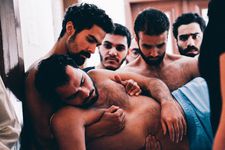_600.jpg) |
| Mazen Khaled: 'The act of jumping is of turning your back on society and jumping out of it towards the freedom of the horizon and sometimes dying while at it' |
Mazen Khaled's Martyr recounts a fateful few hours for a young man and his friends who go to the beach in Beirut. Made as part of Venice Film Festival's 2017 Biennale College mentoring programme - along with Strange Colours and Beautiful Things - it has an experimental edge to it, blending the naturalism of the men's lives with evocative shots of the naked body of the central character and choreographed dance segments. We caught up with Khaled shortly after the film's Venice premiere to talk about some of its themes (themes which some people might feel contain spoilers, although the main plot is revealed in the plot synopsis).
you tell me a bit about your use of masculinity in the film? You start with a long look at the male body before the action even starts, you're encouraging people to focus on that physicality. Why did you want to start with that image?
In a way, I like to establish the language of this film. You could call it the male body or really it's just the body. The idea is to establish that we are speaking the language of the senses. This is for two reasons. Number one, I've always thought maybe the brain isn't the smartest organ of the body we have, maybe our bodies are smarter and decisions we make with our senses are sometimes smarter. And Hassane is in that realm right now. Number two, is the first scene, from the moment when he's like a statue, ready to dive. The next moment, we see him suspended under water - we don't see him jumping - so this is a representation or an avant-presentation of the death scene.
For me, what dies? It's our senses that die. There's a lot of theories. Does the mind die? Does the soul die? Everyone has their own theory. What I was interested in was that death really means that our senses have died, it is followed closely by the masturbation scene, where his sexuality and his desire is interrupted so I really wanted to establish that, when someone dies, the foremost death is the death of desire and the senses, which makes it a more difficult loss, for me at least. When I look at someone, all this desire, all this longing, all this love, just died. There's a lot more than just the simple act.
 |
| Mazen Khaled: 'I've always thought maybe the brain isn't the smartest organ of the body we have, maybe our bodies are smarter and decisions we make with our senses are sometimes smarter' Photo: Belal |
Yes, I'm drawn to the idea of universality. I think human experience is very shared. The idea of martyrdom is all over the world but except right now in the West, it's surviving only mostly in art - Christianity is surviving mostly in art. In the Middle East, it has taken on a new meaning where it is only death in some horrible way, in a war, an explosion or decapitation, it has taken on a new definition. But, in Islam, it means something different.If you die at sea, you're a martyr. If you die from a very painful cancer, you're a martyr. If you die going to work to make your ends meet, you're a martyr. So, martyrdom is a lot wider. But in our world today it's becoming single pointedly focused on one thing. But I would like to shed some light on the term - not that I like the term.
Masculinity seems to also be scrutinised in the film. That slightly toxic masculinity of young people, seen in many countries, slightly disaffected and who don't have an outlet for some of those sensory ideas that you're talking about. They aren't negative in the sense of going off and being a terrorist, for example, but they are negative in their own environment.
The guys on the street, the ones that aren't his friends any more, his family removed him from that milieu and told him to go and get a job. So those guys on the street probably are part of the whole war culture. Hassane says, "My father removed me from there", but then he says, "I wish when he removed me he had put me somewhere else." So when he was removed from the war situation he found he has no place in society, so I think part of him died because he wanted to die.
Water imagery flows through the whole movie, you start in the water, then we see them swimming and, later, washing has a crucial role, could you tell me about your approach to that?
 |
| Mazen Khaled: 'I'm drawn to the idea of universality. I think human experience is very shared' |
I want to say something about these men who jump from the balustrade. This is what started the whole idea of the film, because I was so fascinated by the idea that they would jump from so high - it's a very dangerous hobby that could lead to their death. But then I looked at it and it struck me that those guys are turning their backs to the city - Beirut is surrounded by a balustrade that's like a border to the city. Outside of it is the rocky shore and the Mediterranean, so the act of jumping is of turning your back on society and jumping out of it towards the freedom of the horizon and sometimes dying while at it. That's the fascination, they go into the water, but why do they go into the water? The shore's their freedom but really the water is their peace and they are looking for a peaceful life, if you want.
It occurred to me that they were looking for a sensory rush or the thrill of the adrenaline rush. They're looking for an outlet for their excitement.
They could be, because I always say I don't own my work - you can read what you want to read. It definitely can be part of their paradigm but I feel like one of them refuses to do it I think they're really looking to be together and to be happy and peaceful. You see that in how they play in the water - they're like sea animals somehow, seals or penguins. Definitely there's a rush somewhere. But I think his jumping was a search for peace. You hear it in the sound design. When we're under water it becomes very peaceful even when the camera is going up and down. When we're above water it's very noisy and crazy and the minute we go under water we turn to being very calm and peaceful.
When did you decide to incorporate the 'performance' aspect into the film. You have these cutaways, where we see actors performing outside of the story.
 |
| Mazen Khaled: 'We decided dance was the medium for this film, because we are talking about the body and sensuality and how do you express sensuality with your body? It's movement' |
And the movement of dance and swimming aren't that far apart.
Exactly. One more thing is something that, from the beginning stayed with me. If you jump into the water and you let yourself go, yours arms naturally go around in a movement that feels like you're hugging the water, so that became the leitmotif movement. Every time he is under water you see his arms gathered in front of him as if he's hugging nothingness or the water. He also uses it in the dance or in the fantasy parts.
What about the sexual politics, it's just men in the company of men by the seaside. Do you think it would be better for them if it was more mixed?
I try to be an observer. If you go to that part of the Corniche in Beirut, there's rarely a woman beyond the balustrade. It's a strictly male space, from age two, up to the age of 80 and 90, you see men sunbathing and dancing and establishing pecking orders and behaving homosocially. This is the first impulse - to observe and say why is this happening? I wouldn't call it homosexual behaviour, it's homosocial and it's common in the Mediterranean, not just the Middle East. In Beirut, in particular, because women aren't interested in venturing to the rocks, it became a male space. Maybe they're harassed if they go, I'm not sure. I wanted to observe and not meddle in it. But I do imagine because of their marginality, they haven't succeeded in acquiring partnerships with women. One of them talks about being in love with a woman with a child but he couldn't do it because he thought she needed someone with a future, so why would she want to be with him? So, it's alluded to in a way. There's definitely part of it that men our part of the world like to be with each other and there's probably a latent desire, which I always look for in my films. But it's also the fact these men are marginal and they don't have relationships, so it's a simple as that.
Martyr is screening as part of BFI Flare





















